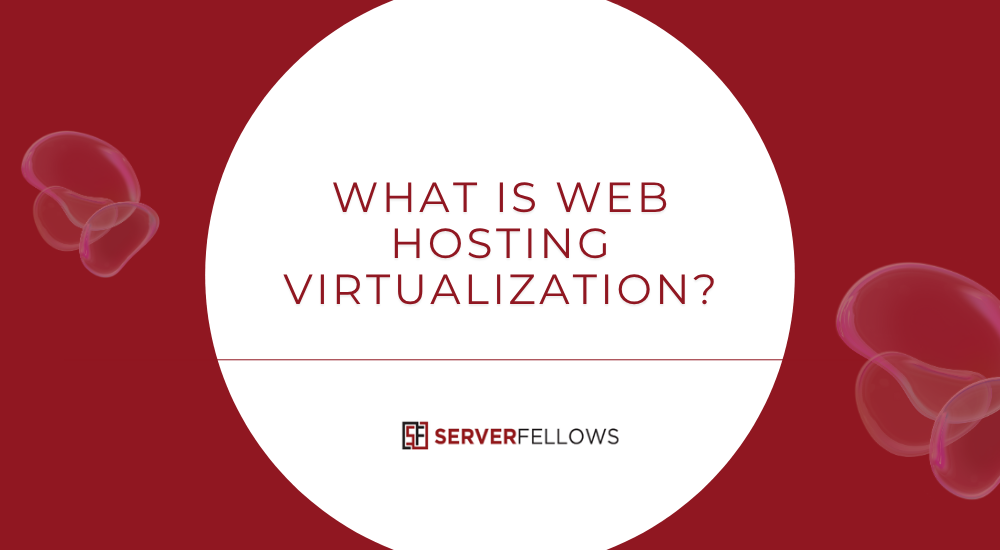
What Is Web Hosting Virtualization?
In today’s digital-first world, businesses rely heavily on reliable, secure, and scalable hosting solutions. One of the most transformative technologies powering modern hosting infrastructure is Web Hosting Virtualization. Whether you’re managing a small business website or a large-scale application, virtualization provides the efficiency and flexibility that traditional hosting can’t match.
If you’ve come across terms like VPS hosting, cloud hosting, or virtual servers, you’ve already encountered the concept of virtualization in action. It’s the hidden layer that makes advanced hosting possible — dividing one powerful physical machine into multiple independent environments that operate seamlessly.
At its core, Web Hosting Virtualization is about creating more with less — more power, more flexibility, and more reliability from the same hardware. Platforms like Serverfellows.com leverage this technology to deliver robust and scalable hosting environments for businesses of all sizes.
Understanding Web Hosting Virtualization
Web Hosting Virtualization is the process of using software to divide a single physical server into multiple isolated virtual servers. Each virtual server (or virtual machine) acts like a standalone server with its own operating system, CPU, memory, and storage.
Think of it like converting a single-family home into several self-contained apartments — each tenant has private access, resources, and utilities, even though the building itself is shared.
This technology allows hosting providers to optimize their physical resources, ensuring better performance, resource utilization, and scalability for users — all without the cost of maintaining separate physical machines.
How Web Hosting Virtualization Works
To understand how Web Hosting Virtualization works, it’s essential to look at the components that make it possible. The key technology that drives virtualization is the hypervisor — a layer of software that sits between the hardware and the virtual machines (VMs).
1. Hypervisors
A hypervisor is the foundation of virtualization. It manages the creation and operation of multiple virtual machines on a single host server. There are two main types:
- Type 1 (Bare-metal): Installed directly on the hardware. Common in enterprise-grade servers for maximum efficiency and performance.
- Type 2 (Hosted): Runs on top of an existing operating system. Ideal for testing or personal use.
The hypervisor allocates resources like CPU, RAM, and disk space dynamically among virtual machines, ensuring that each one gets the power it needs without wasting unused capacity.
2. Virtual Machines (VMs)
Each Virtual Machine acts as an independent environment. You can install different operating systems (Windows, Linux, etc.) on separate VMs, run applications, and configure settings — all isolated from one another.
If one VM encounters an issue (for example, a software crash or malware attack), the other VMs remain unaffected. This isolation makes Web Hosting Virtualization a secure and reliable solution for multi-user hosting environments.
3. Resource Allocation and Management
The hypervisor intelligently distributes server resources across all active virtual machines. This ensures maximum utilization of hardware without overloading the system. Administrators can easily allocate more resources to certain VMs based on performance requirements — a process often referred to as dynamic scaling.
This dynamic nature of virtualization is one of the main reasons why businesses are shifting toward VPS and cloud-based hosting models. Providers like Serverfellows.com specialize in such virtualization-driven hosting solutions that adapt to your growing business needs.
Benefits of Web Hosting Virtualization
The rise of Web Hosting Virtualization has completely transformed how hosting services are deployed and managed. Here are the major advantages:
1. Resource Efficiency
Virtualization maximizes hardware utilization. Instead of dedicating one physical server to a single client, multiple clients can share the same hardware through isolated virtual servers. This leads to lower costs and higher efficiency.
2. Scalability
With virtualized environments, scaling becomes effortless. You can increase CPU, memory, or storage resources in minutes — without moving to a new server or experiencing downtime. This flexibility makes Web Hosting Virtualization perfect for startups and enterprises alike.
3. Security Through Isolation
Each virtual server operates independently, meaning if one is compromised or faces an issue, others remain secure. This isolation enhances the overall security posture of the hosting environment.
4. Improved Reliability
Since virtual machines are independent, maintenance or updates on one server don’t affect others. Additionally, snapshots and backups can be created instantly, allowing for quick recovery in case of unexpected events.
5. Cost Optimization
Instead of managing multiple physical servers, hosting providers can use one physical server to host many clients, significantly reducing energy and infrastructure costs. These savings are often passed on to customers, making virtualization-based hosting more affordable.
6. Flexibility for Developers
Developers can create, test, and deploy applications on virtual environments without affecting the production server. Each virtual machine can replicate different setups, enabling faster development cycles.
Web Hosting Virtualization vs Traditional Hosting
| Feature | Traditional Hosting | Virtualized Hosting |
|---|---|---|
| Resource Allocation | Shared or fixed on one physical machine | Dynamically allocated across multiple virtual servers |
| Scalability | Limited, often requires migration | Easily scalable within minutes |
| Security | Shared environment poses risk | Isolated virtual machines enhance security |
| Performance | Can degrade with multiple users | Optimized performance using resource management |
| Cost | May require multiple physical servers | Consolidates servers, reducing cost |
Traditional hosting locks users into rigid configurations. In contrast, Web Hosting Virtualization empowers users with flexible and independent environments — all within a single powerful server infrastructure.
When you choose a provider like Serverfellows.com, you gain access to enterprise-grade hypervisors and virtualization technologies that enhance performance and reliability without the overhead of physical maintenance.
The Role of Virtualization in VPS and Cloud Hosting
The two hosting types most dependent on virtualization are Virtual Private Server (VPS) hosting and Cloud hosting.
VPS Hosting
In VPS hosting, a single physical server is divided into multiple virtual servers using virtualization. Each VPS has dedicated resources, its own operating system, and full control, mimicking the functionality of a dedicated server at a fraction of the cost.
For businesses seeking performance, control, and affordability, VPS hosting powered by Web Hosting Virtualization is the perfect balance.
Cloud Hosting
Cloud hosting takes virtualization further by linking multiple physical servers to form a networked environment. Resources are distributed dynamically, so if one server experiences heavy load, another picks up the slack — ensuring uninterrupted performance.
This distributed model wouldn’t be possible without virtualization. It allows for elastic scaling, enhanced redundancy, and seamless failover, making cloud hosting the backbone of high-availability infrastructure.
Whether you need VPS or cloud hosting, Serverfellows.com offers solutions built on cutting-edge virtualization systems, giving your business the speed, flexibility, and reliability it deserves.
Advanced Applications of Web Hosting Virtualization
Beyond typical hosting, Web Hosting Virtualization serves multiple advanced applications across industries:
-
Testing and Development Environments
Developers can build multiple isolated testing environments on the same server, allowing parallel development and faster deployment. -
Disaster Recovery
Virtual machines can be cloned or backed up easily, ensuring rapid recovery in case of hardware failure. -
Load Balancing and Optimization
Virtualized systems distribute workloads efficiently across different machines to maintain optimal performance. -
Energy Efficiency
Consolidating physical servers through virtualization reduces energy consumption and hardware waste — promoting sustainable hosting infrastructure. -
Business Continuity
Since virtual servers can be replicated and restored quickly, businesses can ensure continuity even during unexpected disruptions.
Security Aspects of Web Hosting Virtualization
Security is often a major concern in hosting, and Web Hosting Virtualization addresses this effectively:
- Isolation: Each virtual environment operates independently, so vulnerabilities in one VM do not spread to others.
- Snapshots and Rollbacks: Administrators can create snapshots before updates or major changes, allowing instant rollback if something goes wrong.
- Access Control: Permissions can be defined at the hypervisor level, ensuring strict access management.
- Monitoring and Auditing: Virtualized systems allow detailed resource and activity monitoring to detect anomalies early.
At Serverfellows.com, virtualization is not just about performance — it’s about secure, controlled environments where your data and applications remain protected.
Common Misconceptions About Web Hosting Virtualization
Despite its widespread adoption, some misconceptions persist about Web Hosting Virtualization:
-
“Virtualization is only for large enterprises.”
False. It’s equally beneficial for small and medium businesses that need flexibility and reliability. -
“Virtual servers are slower.”
Not true. When properly configured, virtual machines perform as efficiently as physical servers, thanks to optimized resource allocation. -
“Virtualization is complicated.”
While the underlying technology is complex, providers like Serverfellows.com simplify the experience with managed services, user-friendly panels, and scalable solutions. -
“Security is weaker in virtualized environments.”
Actually, the isolation between VMs often enhances security compared to shared hosting environments.
Future of Web Hosting Virtualization
The future of Web Hosting Virtualization is evolving rapidly with innovations in hypervisor technology, containerization, and hybrid infrastructure. As more organizations adopt cloud-first strategies, virtualization will continue to form the backbone of scalable, efficient, and secure web hosting.
Emerging trends include:
- Container-Based Virtualization: Tools like Docker and Kubernetes are streamlining deployment and scaling for applications.
- Hybrid Cloud Models: Combining private and public virtualized resources for optimal cost-performance balance.
- Edge Virtualization: Deploying virtualized environments closer to users to reduce latency and enhance speed.
- AI-Driven Resource Management: Automated optimization of resources based on real-time performance analytics.
Providers that innovate in this space, such as Serverfellows.com, are positioning themselves at the forefront of next-generation hosting — delivering seamless performance and scalability for digital businesses worldwide.
FAQs on Web Hosting Virtualization
1. Is Web Hosting Virtualization secure?
Yes. Each virtual machine operates independently, preventing issues or breaches from spreading to others.
2. Does virtualization improve performance?
Absolutely. By efficiently managing and allocating resources, virtualization ensures optimal performance across multiple virtual servers.
3. Can small businesses use virtualization-based hosting?
Yes. Web Hosting Virtualization is ideal for startups and SMBs that need flexibility, scalability, and cost control.
4. What hosting types use virtualization?
Both VPS hosting and cloud hosting rely on virtualization as their core technology.
5. Can I migrate easily between virtual servers?
Yes. Virtual machines can be cloned, migrated, or scaled without downtime, ensuring continuous service availability.
Conclusion
Web Hosting Virtualization is the driving force behind the modern web hosting ecosystem. It enables scalability, efficiency, and resilience — allowing businesses to maximize server performance while minimizing cost and downtime. From VPS hosting to advanced cloud infrastructure, virtualization is the reason web services can scale effortlessly.
Whether you’re an entrepreneur launching a new website or a growing enterprise needing high-availability solutions, the right hosting provider can make all the difference.
Choose Serverfellows.com — where advanced virtualization meets dependable performance. Experience flexible, secure, and high-performance hosting built for the future.


